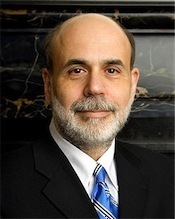Matthew Yglesias's Blog, page 2377
March 24, 2011
Federal Reserve Press Conferences

The Fed announced today that Ben Bernanke is going to start holding regularly scheduled press conferences. I'm open to persuasion, but this seems like a bad idea to me.
Expectations are a very important part of monetary policy. That's why Open Market Committee meetings end with the release of a written statement offering public guidance about what's happening and not just a 140 character tweet about interest rates. That statement is assembled, one hopes, with care and precise wording. In a live press conference there's a lot that could go wrong, and I see relatively little upside.
On some level, though, this is clearly intended as some kind of pushback to the political criticism the Fed's been getting for the past year. That makes sense, but it underscores the fact that there needs to be a progressive anchor to this debate and not just a circling of the wagons around an institution that has, in fact, failed.


European Monetary Union (Unfortunately) Working As Planned

Kevin Drum ruminates on the European situation:
It's easy to say this from a distance, but Merkel and other European leaders have their heads in the sand. They don't want Greece, Ireland, or Portugal to default because that would mean big losses for banks in their own countries, which would then have to be bailed out. But they also don't want to directly bail out the insolvent countries, because voters wouldn't like that much. So they're kicking the can down the road with half measures and hoping that somehow things turn up. It's a recipe for stagnation at best and disaster at worst.
The scary thing is that this is more or less European monetary union working as planned. The introduction of a single currency has de facto committed the nations of Europe to a level of fiscal union that's politically unacceptable. But total collapse of the European banking system is also politically unacceptable. So they'll keep kicking the can down the road with half measures until ultimately they wind up much further down the road to fiscal union than anyone deems conceivable. And the same applies to labor market integration. There's some level of sustained unemployment in Portugal that induces people to migrate to Copenhagen in search of work, and over the next five years we'll find out what that level is. But in the interim we're going to witness a lot of stagnation and disaster.
But this is basically the plan. Achieve political union by unleashing a doomsday device in the form of monetary union and assume that over time people can be dragged into making it work. The politicians in the UK and Sweden who kept their countries out of this deserve enormous credit.


Capital Controls Increase Monetary Policy Autonomy
I saw a Tyler Cowen link to a paper under the text "Are capital controls actually effective?" I assumed the conclusion of the paper must be that they're not. But actually it seems to me that Nicolas Magud, Carmen M Reinhart, and Kenneth Rogoff are finding that capital controls have some important effects. Specifically, controls on capital inflows:
— Make monetary policy more independent,
— Alter the composition of capital flows, and
— Reduce real exchange rate pressures (although the evidence on the latter is more controversial).
— Do not reduce the volume of net flows (and hence the current-account balance).
The question facing policymakers is whether the distorting effect of altering the composition of capital flows is a bigger deal than the increased ability to fight recessions. Presumably the question "at what margin?" is relevant here. But this seems like a very relevant consideration.


Rogue Cops in Uganda

I think a big lacuna in rightwing thought about government capacity and government competence is the fact that the least controversial public service agencies are also the most dangerous. Consider this Human Rights Watch report about the police in Uganda:
The Ugandan police Rapid Response Unit frequently operates outside the law, carrying out torture, extortion, and in some cases, extrajudicial killings, Human Rights Watch said in a report released today. Ugandan authorities should urgently open an independent investigation into the unit's conduct and activities and hold accountable anyone responsible for human rights violations, Human Rights Watch said.
The 59-page report, "Violence Instead of Vigilance: Torture and Illegal Detention by Uganda's Rapid Response Unit," documents the unit's illegal methods of investigation and serious violations of the rights of the people it arrests and detains. The unit has a history of violent and unlawful operations since it was formed by President Yoweri Museveni in 2002 as Operation Wembley, an ad-hoc security entity commanded by an active member of the Ugandan military. Later, the unit became the Violent Crime Crack Unit and was formally taken under police command. In 2007, it was renamed the Rapid Response Unit.
"Changing the unit's name, leadership, and command makes no difference to the people this unit tortures, detains, or in some cases kills," said Daniel Bekele, Africa director at Human Rights Watch. "The authorities and the donors who fund the police need to get serious about holding abusive officers of this unit accountable."
You can't just look at this, wave around an old essay on public choice economics, and say "this goes to show why countries shouldn't have police" or "big government policing just can't work." And yet this kind of problem with corrupt and violent security services is incredibly common in the developing world (and not entirely unheard of in the USA). One of the big things that all the most successful countries have in common is relatively well-functioning public institutions grounded in some kind of publicly endorsed ethic. The question of how you create and sustain this kind of situation is much more important than whether the government is "big" or "small."


Kauffman Study Argues That Supercharged Financial Sector Reduces Entrepreneurship

It's easy to assume that middle class wage stagnation reflects the owners of capital reaping a larger share of returns, in classic class war style. But that doesn't actually seem to be happening. Instead we're seeing the immiseration of capital as well. The returns have largely gone specifically to people working in the financial services industry rather than to "the bosses" as such. This is an anomalous kind of situation, and to many people it seems intuitively like a troubling one. The Kauffman Foundation, which I think you can generally characterize as right of center, has produced a study saying we should indeed be trouble, and super-finance is starving the economy of entrepreneurship:
The financial sector, which includes lending, stock brokerage, complex securities and insurance, among many other services, derives enormous profits from collateralized debt obligations. These new products require such sophisticated engineering that the industry now focuses its recruiting on new master's- and doctoral-level graduates of science, engineering, math and physics, and pays them starting wages that are five times or more what they would have earned had they remained in their own fields.
"Because these new hires are often the very individuals who otherwise would have comprised the most robust pool of prospective founders of high-growth companies, the financial services industry's steady rise has had a cannibalizing effect on entrepreneurship in the U.S. economy," said Paul Kedrosky, Kauffman Foundation senior fellow and one of the paper's authors. "Excessive financialization exacerbated and distorted the flow of capital in the economy, potentially suppressing entrepreneurship by drawing away entrepreneurial talent."
Certainly my observation when I was in college is that almost everyone who had the mentality "I'd like to make a lot of money in life" was planning to instantiate that plan by working in the financial services sector. Supposedly this flow of talent should produce a more optimal flow of financial capital, but there's ample reason to think that the objective incentives point toward applying your talent to finding more clever ways of gaming the system.


What Would "Prompt Consideration" Of The Bowles-Simpson Proposal Accomplish?

I'll confess to being a little bit confused by what it is the former Council of Economic Advisors chairs who co-signed this op-ed are actually proposing:
To be sure, we don't all support every proposal here [i.e., from the Simpson-Bowles Commission]. Each one of us could probably come up with a deficit reduction plan we like better. Some of us already have. Many of us might prefer one of the comprehensive alternative proposals offered in recent months. Yet we all strongly support prompt consideration of the commission's proposals. The unsustainable long-run budget outlook is a growing threat to our well-being. Further stalemate and inaction would be irresponsible.
We know the measures to deal with the long-run deficit are politically difficult. The only way to accomplish them is for members of both parties to accept the political risks together. That is what the Republicans and Democrats on the commission who voted for the bipartisan proposal did. We urge Congress and the president to do the same.
Are they saying congress should enact these proposals into law? Doing so would, obviously, reduce the projected budget deficit. But they authors are assuring us that they don't actually support all of the proposals. And neither do I. Consequently, if I were in congress I would vote against enacting these proposals into law if they came up for a vote. But in other sentence the authors appear to be merely urging congress to bring the proposals up for a vote. But what's the point? John Boehner and Mitch McConnell have already clarified that they oppose the commission's tax reform proposals. And the proposed reform, though slightly revenue-positive, involves a large decrease in tax rates on high income individuals. On what planet is a combination of tax cuts for the rich and deep spending cuts supposed to pass over the objection of the Republican leadership? That's just silly.
As I've been saying, to make progress on the long-term budget what needs to happen next is that the House Republicans need to write down a budget proposal. Because the White House wrote down a budget proposal, it's possible for deficit hawks to look at the proposal and say that the deficit being proposed is higher than they like. Which is fine. So now the question is what's an idea that Republicans support that offers a lower deficit? My strong suspicion is that if forced to go through the exercise, Republicans will either move away from their current tax pledge (unlikely) or else develop a proposal that involves a higher deficit than what Obama is proposing (likely). Either way, the stage would be set for a new move in the iterative game. But as long as there's no proposal from the Republicans, there's nothing to talk about. I agree with Jon Bernstein that it's very possible Republicans just won't write a budget, but if that's the case then that's the problem. Without a budget proposal, the process can't move forward.


The Case For Gingrich
My ThinkProgress colleagues' hit on Newt Gingrich for flip-flopping on Libya and then flopping again via Facebook is nice, but the fact is that Gingrich is a pretty admirable political leader. After all, how can you not like a guy who's pledged to work with Nancy Pelosi to combat the threat of climate change:
It seems to me that we need more of that kind of leadership from Republicans, not less, and that progressives ought to welcome Gingrich's return to prominence in GOP circles. Or has he changed on this issue too?


Kinds of Recessions

(cc photo by LateNightTaskForce)
Are recessions caused by asset price busts fundamentally different from recessions caused by central bank efforts to curb inflation? A lot of commentary suggests that they are. Hence talk about "balance sheet recessions," etc. I don't really buy it. And Ryan Avent has some doubts as well:
I need to go catch a flight, so I don't have a lot of time to dig into this, but let me just offer one thought on this view (which is one I've long shared). What if the difference in the outcomes isn't directly due to the differences in causes? What if the difference in outcomes is due to the fact that because the Fed creates a recession through high interest rate, it—by definition—has plenty of room to loosen policy by cutting rates? And when another shock generates the recession, the Fed, often as not, can't drop rates much before hitting the psychological barrier of the zero lower bound? Just a thought.
I would put this a bit differently. The issue in all cases is one of expectations and credibility. If the Fed causes a recession by raising interest rates, people believe the Fed can and will end the recession by cutting interest rates when it decides that the time has come to do so. Consequently, the decision to change the trajectory of policy from "raise rates" to "lower rates" serves as a powerful coordination point. The rate cut means everyone knows that the magicians behind the curtain have decided that they're not worried about inflation anymore and instead they're worried about increasing real output. That means it's time to start preparing for a climate of elevated demand which, itself, creates a climate of elevated demand.
The problem of the asset price bust is that people don't necessarily believe in the magic. You suddenly have different central bankers running around the planet giving interviews to journalists in which they offer their take on things and they all disagree. Everyone agrees that unorthodox methods are available, but there's no consensus on exactly which methods should be used or to what extent. And since the recession itself is a huge failure of macroeconomic stabilization policy, everyone's losing faith in the wizards behind the curtain. There's no coordination point, just a lot of hiccups. Circular reasoning like "bad macro data will prompt expansionary macro policy and drive asset prices up" becomes temptings. You stop and start and essentially find yourself sitting around in limbo waiting for positive shocks on the real side to turn things around.
Under the circumstances, policy will be most effective if you do what FDR did in 1933—point fingers, throw the bums out, and do something dramatic and "crazy" (abandon the gold standard) to signal your fanatical determination to reflate the economy. Reappointing the incumbent central bank chief who then spends the next two years trying to reassure everyone that nothing too unorthodox is happening seems like exactly the wrong way to go.


Revolutionary Justice in Benghazi
Interesting report from David Zucchino in the LA Times about revolutionary justice behind rebel-held lines in Libya:
For a month, gangs of young gunmen have roamed the city, rousting Libyan blacks and immigrants from sub-Saharan Africa from their homes and holding them for interrogation as suspected mercenaries or government spies. [...] "We know who they are," said Abdelhafed Ghoga, the chief opposition spokesman. He called them "people with bloodstained hands" and "enemies of the revolution." [...] One young man from Ghana bolted from the prisoners queue. He shouted in English at an American reporter: "I'm not a soldier! I work for a construction company in Benghazi! They took me from my house … " [...] The Ghanaian was one of 25 detainees from Chad, Niger, Sudan, Mali and Ghana described by opposition officials as mercenaries, though several of them insisted they were laborers. The officials declined to say what would become of them. [...] One of the accused shown to journalists was Alfusainey Kambi, 53, a disheveled Gambian wearing a bloodstained sport shirt and military fatigue trousers. He said he had been dragged from his home and beaten by three armed men who he said also raped his wife. A dirty bandage covered a wound on his forehead.
Now who knows. Maybe Alfusainey Kambi really was a pro-Gaddafi mercenary fighter who just happens to have gotten beaten up after capture by rebel forces who decided to rape his wife. Or maybe rebel fighters just went on a kind of anti-foreigner pogrom randomly beating people up and raping their wives. Perhaps most plausibly of all, the very real issue of pro-Gaddafi mercenaries from other parts of Africa helped spark a broader anti-foreigner pogrom in which some innocent women are getting raped. As Mao Zedong observed long ago, a revolution is not a dinner party and these things happen. Then again, the Chinese revolution led to the deaths of tens of millions of people. But the American revolution in its violent stage also featured various acts of mob violence and injustice and it turned out more or less okay in the end.
The point is that there's something a bit head in the sand about proclaiming this a simple "humanitarian" undertaking. Showing up with bags of rice in a famine zone is a humanitarian undertaking. Sending in some Marines to help guard the trucks full of bags of rice is a plausible military element of a humanitarian undertaking. What we're doing is providing tactical air support to one faction in a civil war in order to help them prevail against a rival faction that has much more heavy military equipment. This may or may not produce some net humanitarian benefits in the end, but it's hard for me to know how you'd make an accurate forecast about that one way or another.


State-Level Anti-Stimulus
Atrios says "All the various cuts that our horrible new Republican governors are trying to implement aren't just going to make the residents of their states suffer, they're also going to work against the macroeconomy."
I don't really think that's true. Federal spending cuts shrink the federal budget deficit and constitute a negative shock to aggregate demand. States have to balance their budgets, so the alternative to a lower level of spending would be a higher level of taxes. In AD terms, it's basically going to be a wash either way. Its the failure of congress to enact some kind of state/local bailout appropriation that's forcing the anti-stimulative state level stuff.


Matthew Yglesias's Blog
- Matthew Yglesias's profile
- 72 followers




